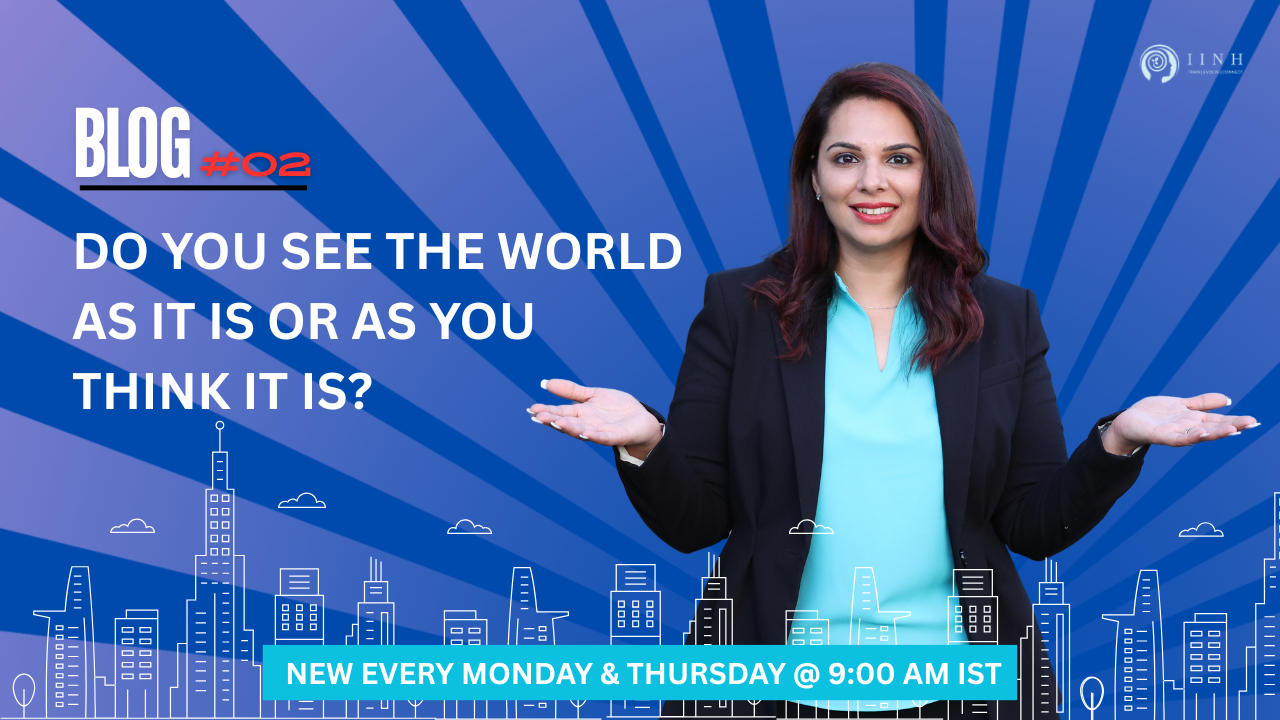Do You See the World as It Is or as You Think It Is?
Oct 02, 2025
Why Your Perception Shapes Everything
Have you ever noticed how two people can experience the same situation completely differently? One person sees a rainy day as ruining their plans, while another sees it as a chance to relax or enjoy something cozy. One person sees being asked to work extra hours as unfair, while another sees it as an opportunity to learn and grow. One person sees criticism as an attack, while another sees it as a chance to improve. One person sees public speaking as terrifying, while another sees it as a way to inspire others. One person sees obstacles as roadblocks, while another sees them as detours to new paths.
The difference isn’t in the events themselves—it’s in how each of us interprets them.
How Your Brain Handles the Flood of Information
Every second, your brain is exposed to around eleven billion bits of information from everything you see, hear, touch, smell, taste, and even think about. Yet it can only consciously process about one hundred twenty-eight bits per second. This means your brain filters out almost everything, focusing only on what seems important at that moment. Without these filters, your mind would be completely overwhelmed by sights, sounds, smells, touches, tastes, and thoughts.
Experiencing the World Through VAKOG
We experience reality through our five senses, which NLP calls VAKOG: visual, auditory, kinaesthetic, olfactory, and gustatory. Because your senses constantly send information to your brain, your mind organizes and filters what you notice. These filters are helpful because they prevent overload, but they also explain why people perceive the same situation in very different ways.
The Reticular Activating System (RAS) – Your Brain’s Spotlight
The RAS relegates a bulk of the information perceived by our senses to our unconscious mind. By doing so, it allows your brain to focus only on what is important. Without this function, maintaining focus would be nearly impossible because our brains are constantly bombarded with information from all directions.
By directing attention to specific things, the RAS shapes your reality. What you focus on becomes more prominent in your perception, while unimportant details fade into the background. You can think of the RAS as a camera lens that focuses on a subject and blurs the unnecessary things in the background to produce a clear photograph. This selective attention allows you to notice opportunities, patterns, and relevant information while filtering out distractions.
NLP Filters That Shape Your Reality
Deletion – Ignoring Parts of Reality
Deletion occurs when we selectively pay attention to certain aspects of our experience while ignoring others. Without deletion, we would be completely overloaded. For example, when watching a movie, some people filter out the sound of a crying child, while others might filter out the movie itself and focus on the child. Deletion shapes your reality because what you notice—or ignore—can make two people experience the same moment very differently.
Distortion – Twisting Reality to Fit Beliefs
Distortion occurs when we misrepresent reality to align with our beliefs. A well-known story illustrates this with a person mistaking a rope for a snake. In daily life, distortions allow us to interpret information in a way that supports our existing beliefs. For instance, if you believe you are not capable of getting a job, when you do receive an offer, you may attribute it to luck rather than your skill. Distortion can limit you with fear or empower you with perspective, depending on how you interpret events.
Generalization – Using Past Experiences as Shortcuts
Generalization is the process of taking a specific experience and applying it more broadly. Words like always, never, everyone, and no one often reflect these generalizations. They influence how we organize our lives and can persist even when contrary evidence exists. For example, a presentation that does not go perfectly may lead one person to believe they are inherently bad at public speaking, while another sees it as a learning opportunity. Generalization can either trap you in self-limiting beliefs or guide you toward growth.
Working With Your Filters
The first step is awareness. Notice when you are deleting, distorting, or generalizing. Reframe limiting beliefs by looking for exceptions to your assumptions. Activate your RAS by intentionally focusing on what you want, training your brain to notice opportunities rather than obstacles. Consciously interpreting feedback, criticism, and unexpected events as growth opportunities strengthens your ability to respond positively to life’s challenges.
Changing Your Lens Changes Your Life
The world itself does not change, but your perception does. By understanding how your brain filters reality through VAKOG, the RAS, and NLP processes such as deletion, distortion, and generalization, you can break free from limiting beliefs, upgrade your inner filters, and create a more empowered perception of life.
If you are ready to explore how NLP, Time Line Therapy®, or coaching can transform the way you see life, booking a free clarity call allows you to start redesigning your lens to notice opportunities, growth, and possibility in every moment.
Book Your Free Clarity Call Now
#NLP #PerceptionShift #MindsetMatters #NeuroLinguisticProgramming #ReframeYourMind #PersonalGrowth #MentalFilters #ClarityCoaching #SelfAwareness #LeadershipMindset #EmotionalIntelligence #LifeCoaching
